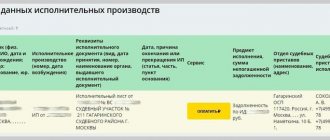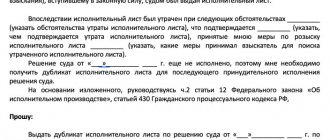After the court has considered the case and made a decision in favor of the plaintiff, the plaintiff can receive a writ of execution. In order to receive a writ of execution, you must make sure that the deadline for appeal has expired or the defendant’s appeal has been denied, and contact the court that made the decision. You can go to court and obtain a document in the following ways:
- Personal application to the court office to submit an application for the issuance of a writ of execution. In this case, you will be able to receive the document in at least 2 weeks, but sometimes the receiving process is delayed for a month or more - unfortunately, the court office often delays the process of issuing the sheet or sending it to the bailiffs.
- Send an application for the issuance of a document by mail with the note sheet also sent to the plaintiff by post.
- Do not receive the sheet yourself, but ask in the application to send the sheet directly to the bailiffs.
a sample application for the issuance of a writ of execution from the link: application for the issuance of IL.rtf
How to get a writ of execution
Important! Obtaining a writ of execution (hereinafter referred to as IL) is possible only after the court decision in the case has entered into legal force (clause 1 of Article 428 of the Civil Procedure Code of the Russian Federation).
If it is necessary to immediately comply with the instructions contained in the IL, the writ of execution is issued immediately after the adoption of the judicial act. To obtain an IL, you should wait until the end of the period allotted for appealing a court decision (for example, if we are talking about the court of 1st instance in a civil case, this period is 1 month).
Note! The internal instructions of the court on record keeping may provide for several additional days during which the IL cannot be issued. This is due to the right of appropriate persons to submit a complaint against a court decision by mail on one of the last days of the period allotted for challenging, which requires a certain time for the delivery of the complaint to the court.
The claimant has the right to receive the IL in hand. The legislation does not stipulate that when receiving a writ of execution, the claimant must write any statements, however, some courts may require this to be done.
At the request of the recoverer, the IL may be immediately sent to the Federal Bailiff Service for execution.
The claimant's representative has the right to receive the IL by proxy.
Also, the claimant may include in his application for the issuance of IL a request to send the document by mail to the address specified in the application.
When receiving the IL, the claimant must have an identification document with him. The representative of the claimant, in addition to his passport, presents a power of attorney confirming his authority.
In what cases do bailiffs have no right to collect a debt?
The law provides for several special cases, in the event of which the collection of debt under a writ of execution is prohibited, even if the money has not been returned. Let's talk about them in more detail.
- Debt to the tax office. If arrears (penalties, fines) accrued by the Federal Tax Service are considered hopeless, they must be written off according to Art. 59 of the Tax Code of the Russian Federation, and the collection of money from the debtor has been stopped.
The tax office can write off the debt of individuals in the following cases:
- The bailiff service returned the writ of execution to the plaintiff due to the absence of the defendant or his property that could cover the debts.
- Five years have passed since the debt arose, and this amount is not enough to carry out the bankruptcy procedure (RUB 500,000 or more).
- The court did not accept the petition to declare the debtor bankrupt and refused to initiate a case, since the applicant is not able to pay for all the procedures.
- The defendant was declared insolvent in the bankruptcy case.
- Administrative penalty . All administrative sanctions must be fulfilled within 2 years from the beginning of the decision on their imposition. After this period, debt collection under a writ of execution or other punishments are prohibited in accordance with the provisions of the Code of the Russian Federation on Administrative Offences. And anyone who deliberately delays time and evades paying the fine will not be among the “lucky ones”, even if 2 years pass. The deadline will be temporarily delayed until the obstacles in debt collection are finally eliminated.
- "Not all at once" . In cases where the defendant has nothing but wages (pensions), the bailiff applies regular deductions from these incomes. The law does not allow deducting more than 50% of available income. The exception is overdue alimony and compensation for harm to health (life), where permissible deductions reach 70%. That is, for citizens from whom the maximum share of the mentioned income is already withheld, collection of other debts is impossible. The exception is a mortgage, where it is possible to sell the apartment to pay off the arrears.
Application for obtaining a writ of execution
The template for an application for obtaining IL is not regulated by law, so it is usually written in free form. The application must include the following information:
- the name of the court to which the said application is addressed (in this case, the court that made the decision in the case);
- name of the claimant, his residential address and contact details;
- the case number on the basis of which the IL was compiled, details of the case;
- a request for the issuance of IL or its referral to the FSSP for execution;
- date of application;
- compiler's signature.
If it is more convenient for the claimant to receive the IL by mail, this must be indicated in the application, as well as the exact address to which the judicial authority should send the enforcement document.
Such an application must be filed with the office of the court that made the decision in the case.
It is recommended to agree in advance with the specialist issuing the IL on the date and time of receiving the IL or submitting the application.
What to check when issuing
Unfortunately, drawing up a writ of execution does not exclude the appearance of factual errors in it, the correction of which always takes additional time. To receive the IL without errors, the defendant should check it immediately before signing the notification of receipt. Here are the main points to pay attention to:
- Standard form. The law provides for the production of a numbered printing form for each IL.
- The document contains the correct case number and the correct date of the decision.
- There are no errors in the details of the district court, the data of the defendant and the claimant. For individuals, we check the full name, address, identifier (TIN or SNILS). For legal entities - name, legal address, actual address, INN, OGRN.
- The requirements specified in the IL clearly coincide with the court decision.
- Correctness of indication of the date of issue of the sheet and the period of its presentation for collection (maximum 3 years).
- The presence of the judge's signature and round seal.
What to do if the IL contains an error
- If an error is discovered before the signature in the notice, then to eliminate it, the claimant only needs to point it out to a specialist. Corrections take several days.
- If an error is identified at the stage of enforcement proceedings or compulsory collection, the claimant will have to fill out a special application for correction of errors and wait for its consideration in the general manner.
Additional falsities may arise if the judicial decision itself contains an error. In this case, at the request of the claimant, the court issues a special ruling on the correction of errors and clerical errors, which must be submitted to the executive body together with the IL.
Obtaining a writ of execution in an arbitration court
The issuance of IL based on the results of consideration of the case in the arbitration court of the 1st instance is carried out by the same court. If the case was considered by the courts of subsequent instances, the claimant can obtain IL in the appropriate court of the 1st instance (clause 2 of Article 319 of the Arbitration Procedural Code of the Russian Federation dated July 24, 2002 No. 95-FZ).
In many ways, the principle of obtaining an IL by an arbitration court is similar to the principle of obtaining an IL issued as a result of a court hearing a case in a civil suit.
You can read about how to obtain a writ of execution in an arbitration court on the official website of a particular court on the Internet. For example, many judicial authorities warn that the claimant must agree in advance with the secretary or assistant judge about the date of receipt of the IL and the method of its presentation. Recording for a specific time is also practiced.
In accordance with Art. 44 of the Federal Law “On Arbitration Courts in the Russian Federation”1 the decision of the arbitration court is executed voluntarily in the manner and within the time limits established in this decision. If the decision does not specify a deadline, then the decision is subject to immediate execution. From this norm it can be assumed that the procedure and deadlines for the execution of an arbitration award are determined only in the award itself. Of course, this is not true. In particular, the reference to the execution of a decision “voluntarily” should be taken as an indication of the operation of the general rules of discretionary civil law regulation, including the norms of Art. 1, 420-422 of the Civil Code of the Russian Federation on the possibility of the parties to independently agree on the procedure for executing the decision of the arbitration court. The established practice of including in the arbitration agreement, in the settlement agreement, as well as in the mediation agreement, conditions on the procedure for the execution of such decisions only confirms this conclusion. In principle, the issues of enforcement of arbitration awards, both forced and voluntary, deserve independent analysis. Here, only execution is execution that requires the performance of appropriate actions immediately after the decision is made (including on the same day); if this requires the actions of the organization and special preparation, then it makes sense to use the terms and procedure for their calculation specified in Art. 190-208 Civil Code of the Russian Federation. In addition, if execution is not carried out on time, forced execution is required, and the relations arising in this case are subject to the rules on enforcement proceedings (their application is also indicated by Article 45 of the Federal Law “On Arbitration Courts in the Russian Federation”).
The general rules for issuing writs of execution against decisions of the arbitration tribunal are provided for in Art. 236-238 of the Arbitration Procedure Code of the Russian Federation and in the relevant norms of civil procedural legislation (in the Code of Civil Procedure of the Russian Federation these are the norms of Chapter 47). It should be noted that the rules establishing the issuance of writs of execution are also provided for by the Federal Law “On Arbitration Courts in the Russian Federation”, while the content of the norms of various acts does not coincide (for example, in terms of determining the composition of the documents submitted with the application for the issuance of a writ of execution). Carrying out the required unification of these norms should be associated with the long-overdue and objectively necessary clarification and adoption of a new edition of the Federal Law “On Arbitration Courts in the Russian Federation”. Some issues of issuing writs of execution for the forced execution of arbitration court decisions are reflected in generalizations of judicial practice2. Within the meaning of the legislation, the issue of issuing a writ of execution is initially determined by the presence of the will of the interested person. Practice shows that many decisions are executed voluntarily; however, in most cases, an application for a writ of execution still follows, regardless of whether the debtor has started execution or not3. The reasons for this are varied, usually this involves fears of the debtor’s probable bankruptcy, the possibility of missing a three-year period from the moment of voluntary execution and thereby losing the very right to enforce the decision. Claimants have the right to apply for a writ of execution, that is, persons in whose favor a decision was made, but it was not executed within the prescribed period. There is no “automatic order” of enforcement. However, exactly the same can be said with regard to the execution of decisions of state courts. The issuance of a writ of execution by a state court against a decision of an arbitration tribunal does not transform this decision into any other. In this regard, the norm sub. 1 clause 1 art. 12 of the Federal Law “On Enforcement Proceedings”4 is not precise: it defines writs of execution issued by courts of general jurisdiction and arbitration courts “on the basis of judicial acts adopted by them” as writs of execution. Of course, if a decision is made by the arbitration court, then the writ of execution is issued on the basis of this decision, and not the ruling of the state court. It is possible to assert otherwise only as a result of substitution of concepts, distorting the relationship between the substance of the decision and the writ of execution as an act ensuring its implementation; Let us note that in such cases the state court does not consider or resolve the dispute at all, and therefore its determination is not a reflection of the state’s position regarding the dispute. The rules provided for by the Federal Law “On Arbitration Courts in the Russian Federation” and in the named articles of procedural legislation on the issuance of writs of execution apply only to decisions of national arbitration courts and for the execution of their decisions only on the territory of the Russian Federation. In accordance with paragraph 3 of Art. 236 of the Arbitration Procedure Code of the Russian Federation, an application for the issuance of a writ of execution for the forced execution of an arbitration court decision is submitted to the arbitration court of a constituent entity of the Russian Federation at the location or place of residence of the debtor or, if the location or place of residence is unknown, at the location of the property of the debtor - a party to the arbitration proceedings. Taking into account the norms of Art. 22 Code of Civil Procedure and Art. 27 of the APC, the issue of jurisdiction should be decided based on the subject composition and the nature of the dispute. This means that if the dispute under consideration is within the jurisdiction of a court of general jurisdiction (for example, one of the participants was a citizen who is not an entrepreneur without forming a legal entity), then you should apply for a writ of execution to a court of general jurisdiction. The formal side of the application for the issuance of a writ of execution is fully expressed in the provisions of Art. 237 Arbitration Procedure Code of the Russian Federation. Firstly, it is submitted in writing, signed by an authorized person of the party in whose favor the decision was made (an option is by filling out a form posted on the official website of the arbitration court on the Internet). Secondly, the application must directly indicate the necessary information for consideration of the application (the name of the arbitration court to which the application is submitted, the name and composition of the arbitration tribunal that made the decision, its location, the name of the parties to the arbitration proceedings, their location or place of residence, date and place of the arbitration court's decision, the applicant's request for the issuance of a writ of execution for the forced execution of the arbitration court's decision.Thirdly, the application for the issuance of a writ of execution must be accompanied by an arbitration court decision (original or certified copy), an agreement on arbitration proceedings (original or a certified copy), a document confirming payment of the state fee, a notice of delivery (sending) a copy of the application to the other party to the arbitration proceeding, a document confirming the authority to sign the application are in principle sufficient to consider the issue on the merits. Issues of proper certification of a copy of the arbitration court decision constitute an independent problem5. It seems that its optimal solution today (without affecting other solution options) should be associated with the introduction of a general rule that initially the arbitration court prepares one mandatory copy of the decision for the possible application of the interested party for a writ of execution. If documents are submitted in violation of the requirements of Art. 236, 237 of the Arbitration Procedure Code of the Russian Federation, the application is left without progress or returned to the person who submitted it. Applications for the issuance of a writ of execution for a compulsory decision of the arbitration court are considered by the judge alone within a three-month period (taking into account the period for preparing for the trial and making a decision). As is known, previously a month was provided as a limit; increasing it to three months actually puts the party seeking protection of its rights in arbitration in an unequal position with those participants in civil relations who took advantage of the usual judicial procedure. We believe that the introduction of such a long period for obtaining a writ of execution in the context of a dispute and the possible removal of the debtor’s assets should have been accompanied by special additional interim measures that would have prevented the minimization of the debtor’s property mass. In principle, taking into account the requirements for the composition of documents provided for in Art. 237 of the Arbitration Procedure Code of the Russian Federation, no other documents are required to make a determination. However, paragraph 2 of Art. 238 of the Arbitration Procedure Code of the Russian Federation provides for the right of the judge considering the case to request (according to the rules provided for by the Arbitration Procedure Code of the Russian Federation) from the arbitration court the materials of the case for which the writ of execution is requested. Thus, the point is that the judge must refer to specific documents (“materials”) that he does not have, but are necessary to make a determination. The legislation does not provide that with such a request the entire case must be sent to the state court. To consider the case upon application, the parties are only notified of the time and place of the court hearing. In this case, the failure of them (their representatives), duly notified, is not an obstacle to the consideration of the case. Of course, the arbitration tribunal itself (a specific judge) cannot be summoned to a state court, nor can it be a participant in the process. In accordance with paragraph 4 of Art. 238 of the Arbitration Procedure Code of the Russian Federation, when receiving an application, the court establishes “the presence or absence of grounds for issuing a writ of execution for the forced execution of an arbitration court decision... by examining the evidence presented to the court to substantiate the stated claims and objections” (clause 4 of Article 238 of the Arbitration Procedure Code of the Russian Federation). This formulation, at least, is not successful. In particular, it allows for the false idea that a state court has the right to re-examine a case that has already been decided. Of course, this is not true. But in this case, the words about “stated demands and objections” should be removed from the specified text of the law. If another application is being considered by the court - to cancel or suspend the execution of the arbitration court, then the court considering the application for the issuance of an enforcement court may postpone the consideration of the last application. However, this is possible only if the deposition is considered “expedient”, which makes it possible to consider special arguments for the deposition necessary. Finally, at the request of the party applying for the writ of execution, the court may in such a case oblige the other party to provide adequate security. The need for a restrained attitude towards the ability of a state court to issue or not issue a writ of execution is also supported by the norms of Art. 239 APC. In accordance with paragraph 1 of this article, “the arbitration court may refuse to issue a writ of execution for the forced execution of an arbitration court decision only in the cases provided for by this article.” This confirms that the norms of the previous article, which indirectly allow the court not to issue a writ of execution based on the considerations mentioned in paragraph 4, are simply stated in an unsuccessful wording that requires changes. The grounds for refusal to issue a writ of execution are specified in clauses 2 and 3 of Art. 239 APC. Formally, the difference between the norms of these paragraphs boils down to the fact that in the first case the court only “can” refuse to issue a writ of execution, while in the second it is obliged to do so. However, the differences do not end there. In particular, in most of the grounds provided for in paragraph 2 of Art. 239 of the Arbitration Procedure Code of the Russian Federation, the situation can be corrected. Apparently, the provided subsection is no exception. 1 case of invalidation of an arbitration agreement. Like many civil law contracts, and this is precisely the nature of the arbitration agreement, it can be “healed”, having defects, in the absence of signs of insignificance, can be eliminated. This is especially true for cases of failure to notify. However, the norm itself sub. 2 is set out unsuccessfully, since, for example, many regulations simply do not contain the obligation to notify the parties about the election (appointment) of arbitrators. In the Federal Law “On Arbitration Courts in the Russian Federation” there is no basis provided for in subsection. 2 p. 2 art. 239 of the Arbitration Procedure Code of the Russian Federation, and in paragraph 2 of Art. 10 of this law, the issue of forming the composition of the arbitration tribunal is referred to the rules of arbitration proceedings. As for subparagraph 3 of paragraph 2 of Art. 239 of the Arbitration Procedure Code of the Russian Federation, then in essence it might not be indicated in the law as a basis for refusing to issue a writ of execution. The fact is that the adoption of a decision by an arbitration court on disputes that do not fall within its competence simply does not give rise to the expected consequences; strictly speaking, there is simply no such act as an arbitration court decision in this case. As we can see, the defects in the arbitration court decision set out in this paragraph are mostly correctable, which - ultimately - gives, as a general rule, the opportunity to take advantage of the rules on repeated arbitration proceedings (see below). It also appears that a number of wordings of this paragraph allow the court, considering the issue of issuing a writ of execution, to deviate from the well-known and unconditional rule that the state court is deprived of the right to independently examine the circumstances (facts) established by the arbitration tribunal and review the arbitration tribunal’s decision on the merits; including Art. 46 Federal Law “On Arbitration Courts in the Russian Federation”. This remark also applies to sub. 5 p. 2 art. 239 Arbitration Procedure Code of the Russian Federation. Of course, it affects the entire wording of this subparagraph. The introduction of the concept of the “bindingness” of an arbitration court decision deforms the quite clear logic of the existing rules that such a decision - unless otherwise provided - is subject to immediate execution, and therefore is binding from the moment it is made (see Article 44 of the Federal Law “On Arbitration Courts in Russian Federation"). This understanding is also supported by the absence of instances in the arbitration court system for appealing decisions. As for paragraph 2 of this article, it provides that the state court refuses to issue a writ of execution for the forced execution of an arbitration court decision if it establishes that: 1) the dispute considered by the arbitration court cannot be the subject of arbitration proceedings in accordance with federal law; 2) the arbitration court's decision violates the fundamental principles of Russian law. However, exactly the same grounds are provided for in paragraph 3 of Art. 233 of the Arbitration Procedure Code of the Russian Federation in relation to other applications - to recognize the decision of the arbitration court as invalid (see also Article 42 of the Federal Law “On Arbitration Courts in the Russian Federation”). Thus, in essence, it is assumed that when applying to a state court for a writ of execution, the decision of the arbitration court itself will actually be canceled. Meanwhile, an appeal to a state court to cancel an arbitration court decision is permissible only if it was not final (Article 40 of the Federal Law “On Arbitration Courts in the Russian Federation”), as well as in the presence of certain other circumstances (for example, if the decision was made on the territory of the Russian Federation, if the application is submitted by a party to the arbitration proceedings). In arbitration practice it is reasonably recognized that under the fundamental principles of Russian law mentioned in sub. 2, it is the constitutional principles that should be understood, and not any legal regulations. In any case, the mere participation in legal relations of entities associated with public institutions does not provide grounds for the application of the norm in question and a writ of execution must be issued. Thus, when considering the complaint of the Federal Property Management Agency, the district court found the following6. The complainant appealed the ruling of the arbitration court, adopted at the request of LLC "O." to the state unitary enterprise "G." on the issuance of a writ of execution for compulsory execution by the arbitration court. According to the decision of the latter, from the state unitary enterprise in favor of LLC "O." a certain amount of money is subject to recovery (debt under the contract and the amount of the arbitration fee). The application was granted by the arbitration court's ruling. According to the complainant, this definition contradicts current legislation and must be repealed. The district court did not agree with this reasoning: the arbitration court’s decision was made on a dispute between two business entities, one of which is a federal state unitary enterprise. This decision does not provide any rights or benefits and does not impose any obligations or restrictions on the Russian Federation or the Federal Property Management Agency. State and municipal unitary enterprises are liable for their obligations with all their property. Under such circumstances, the cassation appeal of the Federal Property Management Agency against the ruling of the arbitration court is not subject to consideration in the arbitration court and the proceedings on it are subject to termination. If a state court refuses to issue a writ of execution, then this fact in itself does not cancel or change the validity of the arbitration agreement (arbitration clause). This means that the relevant dispute still falls within the competence of the arbitration court (and vice versa, another court does not have the right to consider it and resolve the dispute on its merits). Of course, this possibility does not always remain; some of the factors that led to this result are irremovable. Based on the results of consideration of the application, a determination is made: either to issue a writ of execution or to refuse to issue it. Requirements for the content of the definition are provided for in Art. 240 Arbitration Procedure Code of the Russian Federation. The ruling of the arbitration court in the case of issuing a writ of execution for the forced execution of the decision of the arbitration tribunal can be appealed to the arbitration court of the cassation instance within a month from the date of the ruling (clause 5 of Article 240 of the APC). Consequently, in this case the appeal procedure bypasses the appellate authority; This provision is fully confirmed by established judicial practice7. Unfortunately, the text of the law does not contain rules linking the procedure for appealing such determinations with the possibility of autonomous correction of deficiencies, including as a result of concluding a new arbitration agreement, conducting new arbitration proceedings, etc.
V. A. Khokhlov
1 Federal Law of July 24, 2002 No. 102-FZ “On Arbitration Courts in the Russian Federation” - SZ RF. 2002. No. 30. Art. 3019. 2 First of all, in the Information Letter of the Presidium of the Supreme Arbitration Court dated December 22, 2005 No. 96 “Review of the practice of consideration by arbitration courts of cases on the recognition and enforcement of decisions of foreign courts, on challenging decisions of arbitration courts and on issuing writs of execution for forced execution of decisions of arbitration courts" - Bulletin of the Supreme Arbitration Court of the Russian Federation. 2006. No. 3. 3 In judicial practice, we have not found any cases in which the issue of the connection between the issuance (or non-issuance) of a writ of execution and the onset of the deadline for execution (or non-execution) was studied. 4 Federal Law of October 2, 2007 No. 229-FZ “On Enforcement Proceedings”//SZ RF. 2007. No. 41. Art. 4849. 5 See about this, for example: Zaitsev A.I., Filimonova M.V. Commentary on the Federal Law of July 24, 2002 “On Arbitration Courts in the Russian Federation” - Reference legal system “Garant-StroyMaximum. Combined set", 01/18/2011. [electronic resource], hereinafter – SPS “Garant”. 6 See: Resolution of the Federal Arbitration Court of the Moscow District dated January 13, 2011 No. KG-A41/17309-10- ATP “Garant”. 7 See, for example: Resolution of the Federal Arbitration Court of the Volga District dated October 25, 2010 No. A72-1701/2009 - ATP “Garant”.
What to do if you lose a writ of execution
In case of loss of IL, you can apply to the court that issued the relevant judicial act with an application to issue a duplicate of the writ of execution.
Note! Such an application is submitted before the end of the period allotted for presenting the IL for execution (i.e. 3 years from the date of entry into force of the judicial act in accordance with paragraph 1 of Article 21 of the Federal Law “On Enforcement Proceedings” dated 02.10.2007 No. 229-FZ) , if the document itself was lost by the claimant.
An application for the issuance of a duplicate IL is considered at a court hearing. The determination to issue the specified duplicate or to refuse to satisfy such a request may be challenged in court.
Source: RusLawyer
What to do if you receive a court order
When borrowers fail to fulfill their loan obligations, banks can apply various measures to them.
Some financial institutions prefer to sell problem loans to collection services, which then take on all the problems of returning the money. Some banks can file lawsuits and thereby solve the problem of refunds through a court order to collect the debt. There are also creditors who take a waiting position for a long time, after which they suddenly turn to the courts to make a decision. As a rule, borrowers have to deal with a situation where bank letters arrive at their home address stating that a court order has already been issued to collect the entire debt on the loan. At such moments, you need to know how to behave competently and respond to such letters . To do this, it is advisable to initially find out what a court order is.











